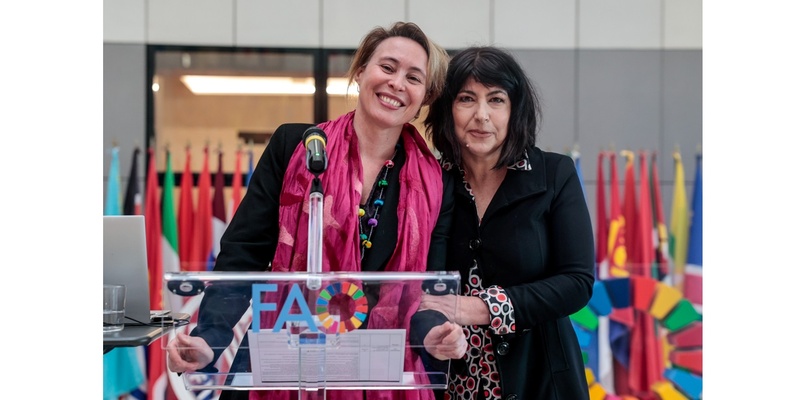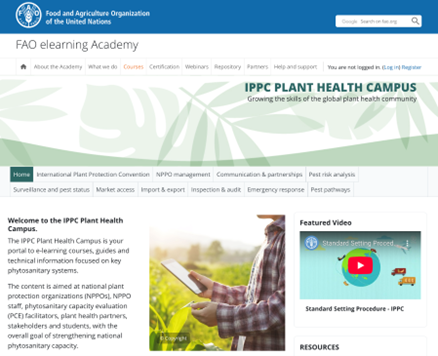SPOTLIGHT: How the IPPC Plant Health Campus is shaping the future of global learning — with Sarah Brunel and Cristina Petracchi
Posted on Thu, 26 Jun 2025, 08:31

© FAO /Photo taken at the IPPC Plant Health Campus launch at CPM-19 featuring Sarah Brunel (left) and Cristina Petracchi (right)
As a spotlight feature for this month we speak to Sarah Brunel, IPPC Officer in charge for day-to-day matters and Implementation and Facilitation Unit Lead, IPPC Secretariat and Cristina Petracchi, Head of the FAO elearning Academy
What is the IPPC Plant Health Campus, and why was it created?
Sarah Brunel:
The IPPC Plant Health Campus is an achievement we’re really proud of. It’s a new global learning platform, available in English and French, where everyone involved in plant health — from inspectors to policymakers — can access free, high-quality elearning courses and associated materials developed by a wide range of experts. We created it to help countries implement the IPPC and its standards more effectively, develop strong phytosanitary systems, and ultimately protect global plant resources. This has all been possible thanks to the very generous contribution of the European Union, within the framework of the project Strengthening Food Control and Phytosanitary Capacities and Governance and the FAO elearning Academy.
Cristina Petracchi:
At the FAO elearning Academy, we’re committed to democratizing access to education, education as a Human Right. Partnering with the IPPC Secretariat allowed us to combine our digital learning expertise with their technical leadership in plant health. The result is a user-friendly platform designed for real impact — flexible, inclusive, and rooted in best practices for adult learning.

Who is this platform for?
Sarah Brunel:
It’s for the entire plant health community — plant protection officers, Phytosanitary Capacity Evaluation facilitators, researchers, students, the private sector and even people just beginning their journey in this field. We wanted the IPPC Plant Health Campus to be useful at all levels, whether someone is starting with the basics or looking to refine their technical expertise.
What kind of content can users expect on the IPPC Plant Health Campus?
Cristina Petracchi:
The IPPC Plant Health Campus contains a wide range of interactive and multimedia content: e-learning courses, videos, downloadable IPPC Guides, real-world case studies, and more. It’s all grounded in sound instructional design and optimized for self-paced, accessible learning — even on tablets and mobile devices. The IPPC elearning courses are associated to a certification based on the FAO Digital Badge Certification System, which demonstrates the acquisition of competencies, in order to progress talents within organizations for in-service professionals.
Sarah Brunel:
And the content is very practical. For instance, we have new e-learning courses like Working with an NPPO and Conducting a Phytosanitary Capacity Evaluation — these directly support national implementation efforts. As mentioned by Cristina, all courses are certified, and learners receive digital badges and certificates they can proudly share on platforms like LinkedIn. That visibility is important — not just for recognition, but for building a strong, connected global community.
Can you tell us more about the tailored learning pathways?
Sarah Brunel:
Yes — this is one of my favorite features! The IPPC Plant Health Campus doesn’t just offer content — it guides users through tailored learning pathways based on their specific roles within an NPPO or similar organization. So, if you’re a plant health inspector or a manager, you can follow a pathway that’s been curated to help you build the skills and competencies most relevant to your job. It’s structured and flexible at the same time— you’re always in control of your pace and progression.
How have you ensured the IPPC Plant Health Campus is accessible to users around the world?
Cristina Petracchi:
Accessibility and inclusion are at the core of our design. The platform is completely free, and courses can be accessed online or offline. That means users with limited internet access can still benefit from the elearning courses and IPPC learning resources by downloading them. We also plan to roll out the platform in multiple languages — it’s currently in English, and French is coming soon, followed hopefully by other languages.
Sarah Brunel:
We really want everyone to feel that this platform is for them. That’s also why we’re encouraging learners to share their achievements. When someone posts their badge or certificate online, it creates momentum. It says: "Plant health matters. And so does learning."
In your view, how does this IPPC Plant Health Campus contribute to strengthening phytosanitary systems globally?
Sarah Brunel:
It’s about equity and consistency. The IPPC Plant Health Campus allows all countries — regardless of resources — to access the same high-quality elearning courses, training materials and tools. That helps harmonize the way International Standards for Phytosanitary Measures, or ISPMs, are understood and applied, which is critical for effective implementation and safe trade. It also supports countries in developing national strategies with a solid foundation of knowledge.
How can someone get started?
Cristina Petracchi:
It’s easy — just visit https://elearning.fao.org/course/view.php?id=1255, create a free account, and start exploring the content. You can learn at your own pace, track your progress, and earn recognition as you go.
Any closing thoughts?
Sarah Brunel:
The IPPC Plant Health Campus is more than a learning platform — it’s a step toward a more empowered, better-prepared global plant health community to collectively achieve the United Nations Strategic Development Goals. I encourage everyone in our community to explore it, use it to support your work, and share it widely. By investing in knowledge and competencies, we’re developing stronger, more resilient phytosanitary systems — together.
Cristina Petracchi:
Education is transformative. By learning, we empower ourselves to change systems, protect the planet, and support sustainable development. We believe in the power of education to transform careers, communities, and lives.
I hope everyone takes advantage of this opportunity to grow — and to inspire others to do the same.
To find out more:
- Explore the Plant Health Campus and make sure to watch the testimonials from colleagues in the field on the homepage
- Découvrez le Campus de la CIPV sur la santé végétale

